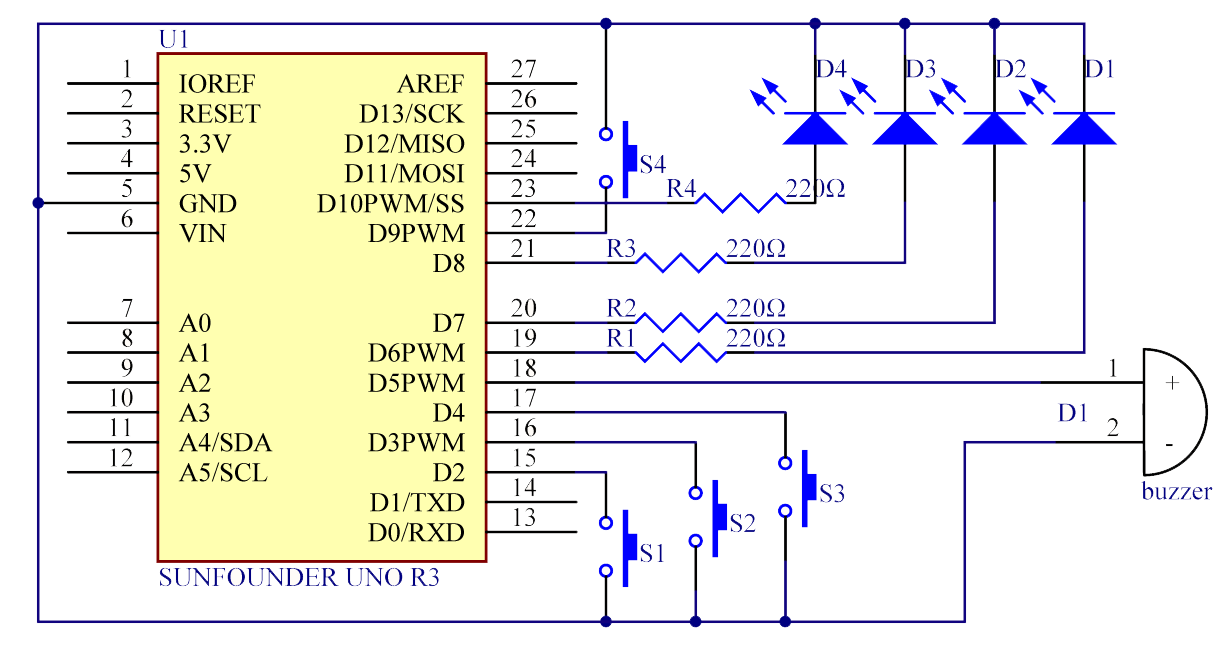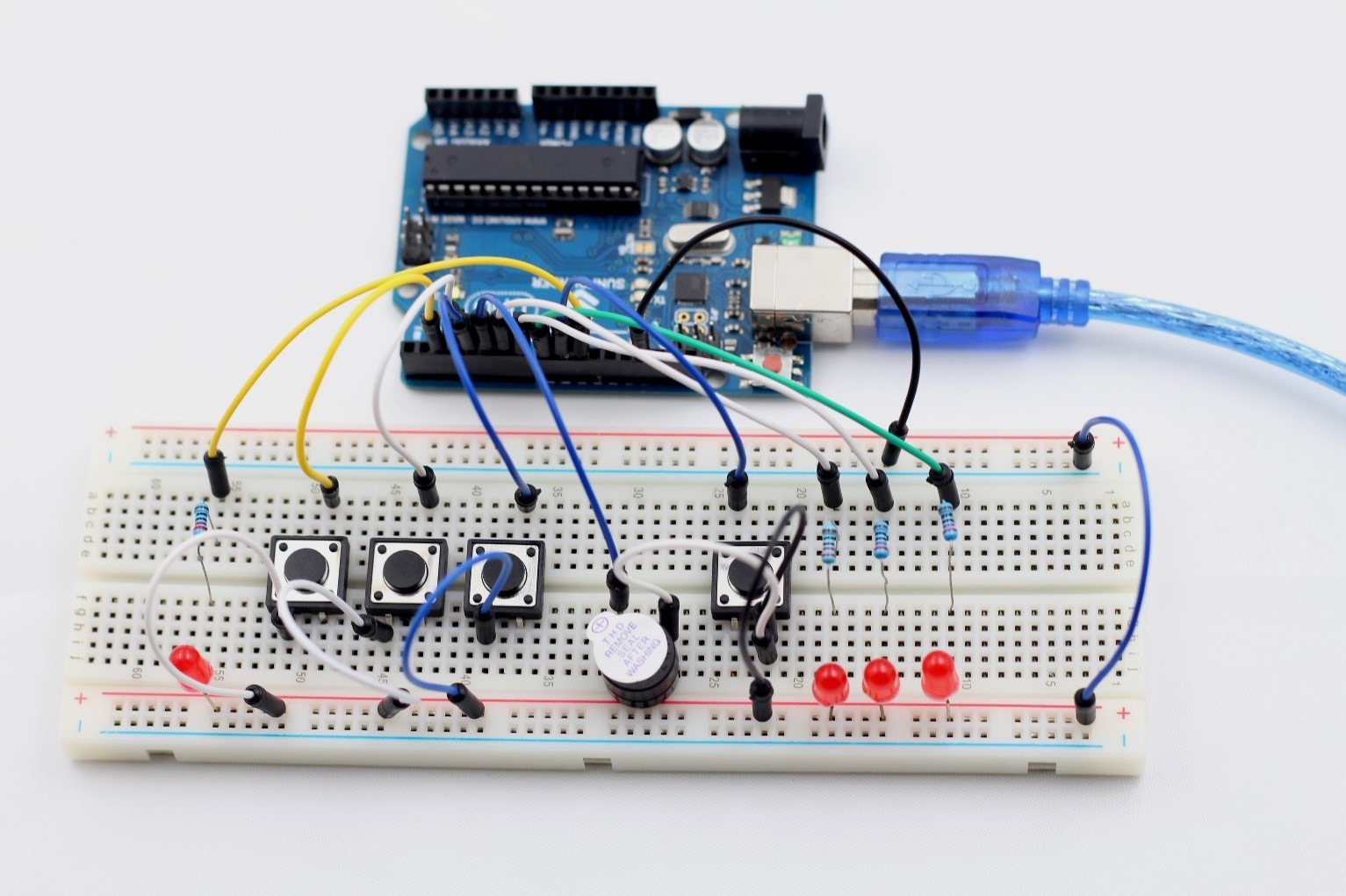Introduction
In quiz shows, especially entertainment activities (e.g. competitive answering activities), organizers often apply a buzzer system in order to accurately, fairly and visually determine the seat number of a responder.
Now the system can illustrate the accuracy and equity of the judgment by data, which improves the entertainment. At the same time, it is more fair and just. In this lesson, we will use some buttons, buzzers, and LEDs to make a quiz buzzer system.
Components
– 1* SunFounder Uno board
– 1 * USB data cable
– 4 * Button
– 4 * LED
– 4 * Resistor (220Ω)
– 1 * Active Buzzer
– Several jumper wires
– 1 * Breadboard
Experimental Principle
Button 1, 2 and 3 are answer buttons, and button 4 is the reset button. If button 1 is pressed first, the buzzer will beep, the corresponding LED will light up and all the other LEDs will go out. If you want to start another round, press button 4 to reset.
Experimental Procedures
Step 1: Build the circuit

The schematic diagram

Step 2: Program (Please refer to the example code in LEARN -> Get Tutorials on our website)
Step 3: Compile the code
Step 4: Upload the sketch to the SunFounder Uno board
Now, first press button 4 to start. If you press button 1 first, you will see the corresponding LED light up and the buzzer will beep. Then press button 4 again to reset before you press other buttons.

Code
| /********************************** * name:Building a Quiz Buzzer System * function: first press button 4 to start. If you press button 1 first, you will see the corresponding LED light up and the buzzer will beep. Then press button 4 again to reset before you press other buttons. **********************************/ //Email:support@sunfounder.com //Website:www.sunfounder.com#define button1 2 //the number of the button 1 #define button2 3 //button2 attach to #define button3 4 //button3 attach to #define button4 9 //button4 attach to #define buzzerPin 5 //the buzzer attach to #define LED1 6 //LED 1attach to #define LED2 7 //LED2attach to #define LED3 8 //LED3 attach to #define LED4 10 //LED4 attach to #define uint8 unsigned char uint8 flag = 0; //used to indicate the state of button4 key uint8 b1State,b2State,b3State,b4State = 0;void setup() { //initialize buzzer,LED1, LED2, LED3 and LED4 as output pinMode(buzzerPin, OUTPUT); pinMode(LED1, OUTPUT); pinMode(LED2, OUTPUT); pinMode(LED3, OUTPUT); pinMode(LED4, OUTPUT); //initialize button1,button2 andbutton3 as input,combined with pullup pinMode(button1, INPUT_PULLUP); pinMode(button2, INPUT_PULLUP); pinMode(button3, INPUT_PULLUP); pinMode(button4, INPUT_PULLUP); //turn all the led off digitalWrite(LED1, LOW); digitalWrite(LED2, LOW); digitalWrite(LED3, LOW); digitalWrite(LED4, LOW); } void loop() { //turn all the led off digitalWrite(LED1, LOW); digitalWrite(LED2, LOW); digitalWrite(LED3, LOW); digitalWrite(LED4, LOW); //read the state of the button4 b4State = digitalRead(button4); //when button4 pressed if(b4State == 0) { if(b4State == 0) //confirm that the button4 is pressed { flag = 1; //if so,flag is 1 digitalWrite(LED4, HIGH); //turn the host LED on delay(200); } } if(1 == flag) { //read the state of the button of buttons b1State = digitalRead(button1); b2State = digitalRead(button2); b3State = digitalRead(button3); //If the button1 press the first if(b1State == 0) { flag = 0; digitalWrite(LED4, LOW); Alarm(); //buzzer sound digitalWrite(LED1,HIGH); //turn the LED1 on only digitalWrite(LED2,LOW); digitalWrite(LED3,LOW); while(digitalRead(button4)); //detect the button4,if pressed,out of the while loop } //If the button2 press the first if(b2State == 0) { flag = 0; digitalWrite(LED4, LOW); Alarm(); digitalWrite(LED1,LOW); digitalWrite(LED2,HIGH); digitalWrite(LED3,LOW); while(digitalRead(button4)); } //If the button3 press the first if(b3State == 0) { flag = 0; digitalWrite(LED4, LOW); Alarm(); digitalWrite(LED1,LOW); digitalWrite(LED2,LOW); digitalWrite(LED3,HIGH); while(digitalRead(button4)); } } } //buzzer sound void Alarm() { for(int i=0;i<100;i++) { digitalWrite(buzzerPin,HIGH); //the buzzer sound delay(2); digitalWrite(buzzerPin,LOW); //without sound delay(2); //when delay time changed,the frequency changed } } |
Video
